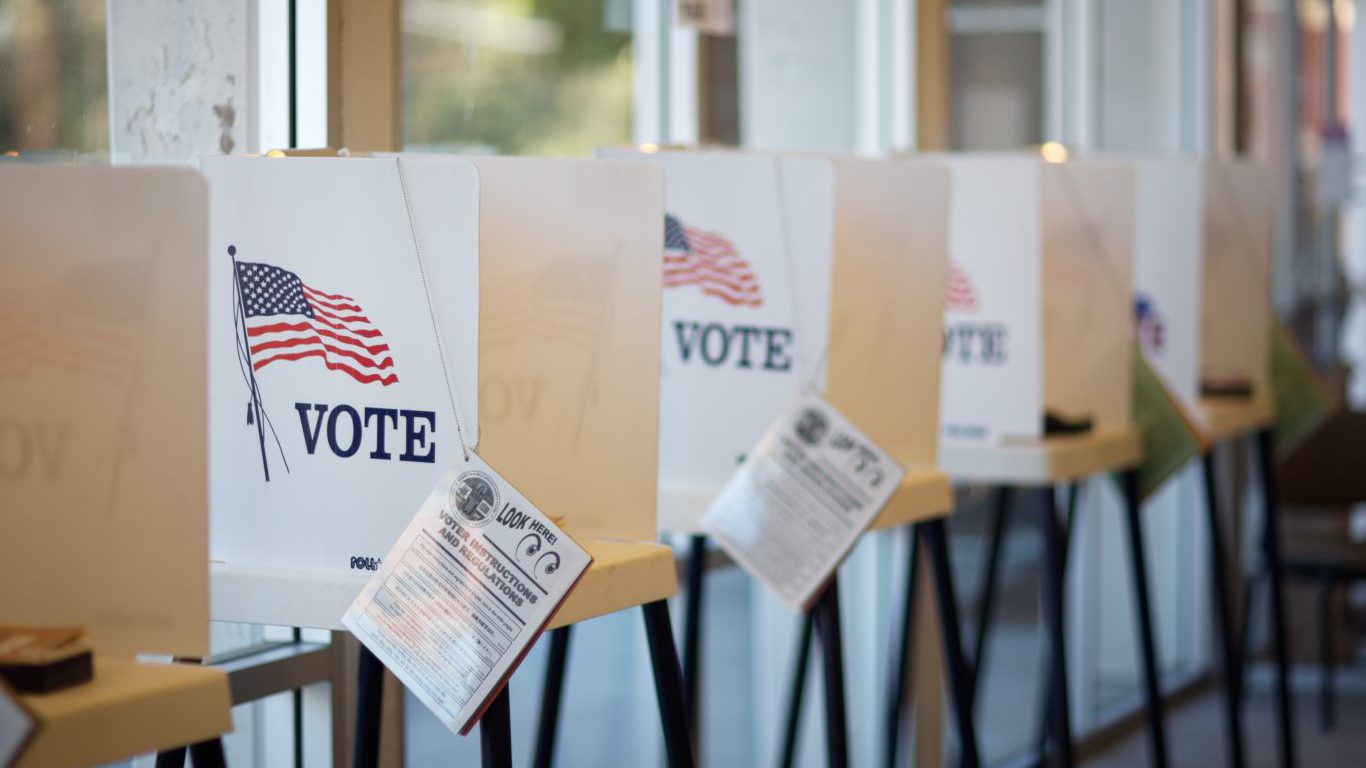Health and Healthcare
4 States Voting on Marijuana Legalization Efforts This Tuesday

Published:
Last Updated:

When midterm elections come around, there are often large issues on the voting ballots other than simply picking candidates who will run local, state and federal offices. One such issue that has gathered more steam in recent years has been the legalization or decriminalization of marijuana. Four states have legalization efforts of sorts up for grabs on Tuesday, November 6, 2018.
Michigan and North Dakota have recreational legalization up for a vote. Also worth noting is that both Utah and Missouri are voting on whether to join the other 31 states that have legalized marijuana for medicinal use. What was not included were non-statewide measures in which cities or towns may have local decriminalization measures or efforts underway.
24/7 Wall St. has provided basic information on the efforts within each state and added color or additional details on each. A link has been added to each ballot measure and additional views have been provided to other media coverage of this topic.
Michigan voters effectively would be mirroring Colorado, allowing for individuals to possess up to 2.5 ounces of marijuana at any given time for individuals aged 21 and higher. The ballot measure basically regulates marijuana at the state level similar to the regulation of alcohol. People also would be allowed to grow up to 12 individual plants for their own consumption. An excise sales tax of 10% would be imposed. In the Michigan governor race, Democrat Gretchen Whitmer supports the state voting to legalize marijuana for recreational use. State Attorney General Bill Schuette, her Republican opponent, is against voting for recreational use but reportedly has said he would respect the will of the voters.
The “Show Me” state of Missouri has three separate medical marijuana initiatives up for vote. One would set doctors in charge of recommending marijuana for a number of ailments and illnesses, with patients able to buy from a dispensary or grow their marijuana at home. The measures are Amendment 2, Amendment 3 and Proposition C, all of which have different proposals for how much medical marijuana would be taxed and how oversight would be handled. The ballot initiative specifies what the state likely would see in taxes and expenses relating to each measure:
The ballot for legalizing marijuana in North Dakota may have been years ahead of what other states might have guessed. After all, this is a deep red state. This was a localized effort, not started by the major legalization groups. While the details on the amount of possession, as well as the legalization for the sale and commercialzation, are not specified, the proposal also would expunge criminal records for individuals who have had prior marijuana (or other controlled substance that has been legalized) convictions. Measure number 3 would remove hashish, marijuana and tetrahydrocannabinols from the list of schedule I controlled substances and would specify that the users be 21 and older.
The Utah ballot calls for voters to decide on legalizing marijuana for medical uses. Either way, the state governor will hold a special legislative session right after the election to craft a more limited medical marijuana bill. In Utah, Republican candidate Mitt Romney prefers for the legislature to deal with this. Democrat Jenny Wilson supports the legalization for medical use. Proposition 2 provides for medical marijuana cardholders not to smoke marijuana or use a device to facilitate the smoking of marijuana, but during any one 14-day period an individual would be permitted to purchase two ounces of unprocessed marijuana or an amount of marijuana product that contains no more than 10 grams of tetrahydrocannabinol (THC) or cannabidiol (CBD).
Some of the data on which parties or likely success have been seen as follows:
Credit card companies are pulling out all the stops, with the issuers are offering insane travel rewards and perks.
We’re talking huge sign-up bonuses, points on every purchase, and benefits like lounge access, travel credits, and free hotel nights. For travelers, these rewards can add up to thousands of dollars in flights, upgrades, and luxury experiences every year.
It’s like getting paid to travel — and it’s available to qualified borrowers who know where to look.
We’ve rounded up some of the best travel credit cards on the market. Click here to see the list. Don’t miss these offers — they won’t be this good forever.
Thank you for reading! Have some feedback for us?
Contact the 24/7 Wall St. editorial team.